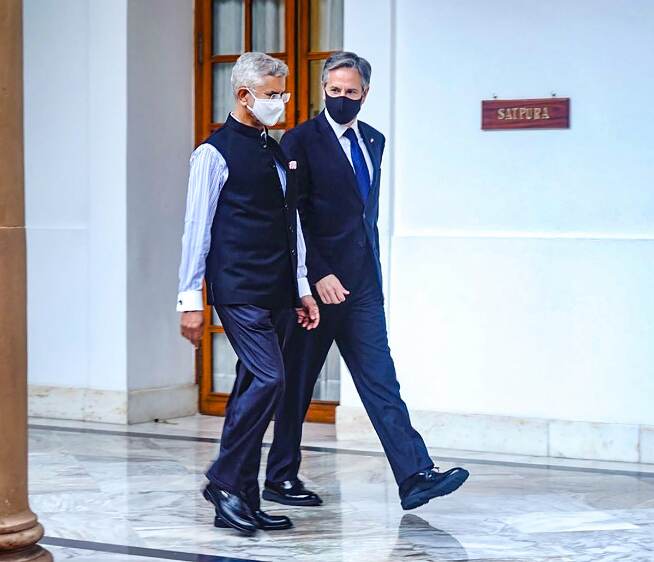Seeking cooperation

On Wednesday, US Secretary of State Antony Blinken made his first official visit to India after joining the Biden administration. While the overall goal of the visit is to strengthen ties between the two nations, there are two major agendas that Blinken is bringing to the table when he meets NSA Ajit Doval, EAM Jaishankar and PM Modi — the situation on Afghanistan post US withdrawal and the Quad grouping that both India and US are a part of alongside Japan and Australia. The Afghanistan agenda is a significant priority for the US at this time as it nears the end of its complete withdrawal from the region after 20 long years of fighting an endless war against 'terror'. Biden's decision to abruptly end the 'forever-war' has left US allies in the region scrambling as another Afghan civil war looms on the horizon. With the US continuing to insist that a military solution to Afghanistan was always a bad idea, the peace process between the Taliban and the Afghan government is being seen as the 'key' to ending decades of war. As such, the US is attempting to bring other regional actors to the table to guide the currently stalled peace process along and India is a vital part of the process. This ranges from discussing India's future role in the region to discussing how Pakistan can be pressured into giving up on its practice of providing funding and safe havens to terror networks, a common concern for both India and the US. Of course, whether India is willing to take up the enhanced role the US wants it to take in Afghanistan is a different matter entirely. Another major topic of discussion was the Quad grouping which China sees as an "Asian NATO" made to counter its interests. Blinken rejected this view during his India visit while saying- "Quad is not a military alliance. Its purpose is to advance cooperation on regional challenges while reinforcing international rules and values that we believe together underpin peace, prosperity, stability in the region." Beyond discussing India's role in preserving a free Indo-Pacific, Blinken covered a wide range of issues that the Quad group would address, ranging from joint action against terrorism to joint production of COVID vaccines. India's recent border issues with China were also reportedly a part of the discussions. Other issues included discussions on climate change cooperation and discussions of "shared democratic values". There were also indications that Blinken would be discussing the Pegasus spyware scandal during his India visit but there have been no reports of any such discussion as yet. Another issue that has been conspicuously absent as yet is a discussion on human rights which the US State Department had asserted would feature in Blinken's India visit. Before the trip began, some commentators were expecting awkward and somewhat charged conversations between the US and India on issues such as human rights and J&K. While the US has generally been careful about staying away from making any political judgments on the situation in Jammu and Kashmir, its leaders have however commented on what they see as human rights violations with a particular focus on the suppression of the right to dissent. Given that Biden has aimed to have a more 'muscular' foreign policy where the US aims to retake its moral leadership of the world following Donald Trump's 'America first' policy, it was expected that the US may indeed pursue a difficult conversation with India on human rights but it would seem that US priorities lie elsewhere. As the purpose of the visit is to strengthen India-US cooperation, it likely makes little sense for Blinken to attempt to rock the boat by bringing up sensitive issues Kashmir, CAA or the farm protests. Indeed, Blinken made multiple references to 'shared democratic values' that both India and the US hold. The closest he came to commenting on human rights was a statement he made after his meeting with a group of civil leaders in Delhi where he said- "The Indian people and the American people believe in human dignity and equality of opportunity, the rule of law, fundamental freedoms including freedom of religion and belief . . . these are the fundamental tenets of democracies like ours," adding "And of course, both of our democracies are works in progress. As friends, we talk about that."



